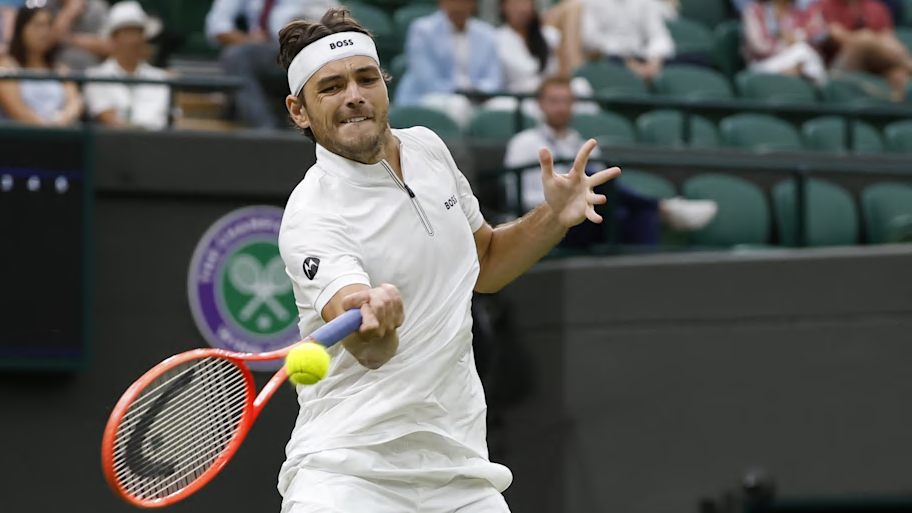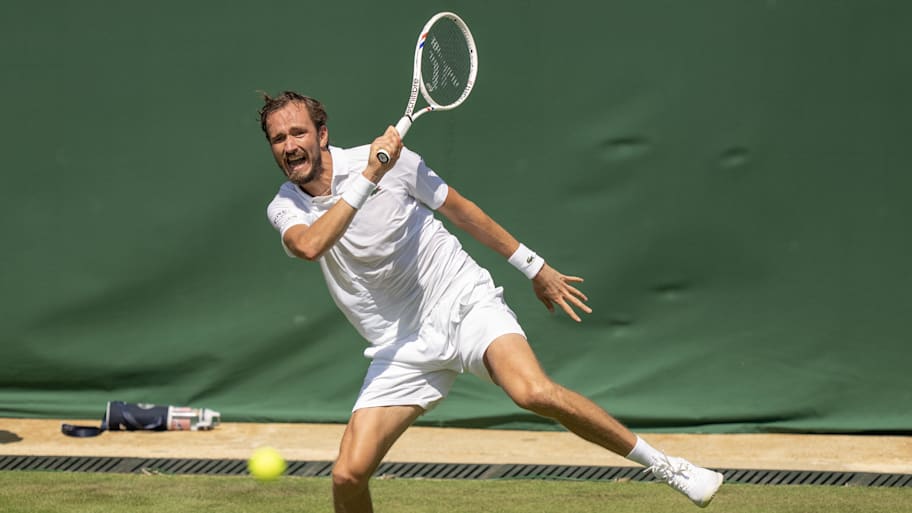
As it is written, Wednesday is mailbag day.
• Here’s some tennis chatter on the Puck’s sports podcast The Varsity with John Ourand.
• Here’s the latest Served podcast:
• Here’s the “2025 Wimbledon Draw Breakdown” in case you missed it** …
**Several picks now look foolish in retrospect.
Onward from the All England Club …
• Far and away, the stoppage of Taylor Fritz’s first-round match against Giovanni Mpetshi Perricard ahead of the fifth set generated the most chatter of any topic. It’s easy to say, This is madness. It is. It’s easy to say, Tennis never misses an opportunity to shoot itself in the foot. That would not be wrong. But this is also an encapsulation of the tennis Tetris problem. Or, more timelessly, this is like a logician’s riddle. Consider:
A) You can’t start play before noon because grass is delicate. (And players—reasonably—don’t want to wake up early to start hydrating and preparing.)
B) There is no clock in tennis so a match could go abnormally long (as both Carlos Alcaraz–Fabio Fognini and Katie Boulter–Paula Badosa did), jamming the schedule.
C) Men insist on playing best-of-five sets (all as athletes in other sports militantly request less action and physical wear and tear).
D) There are a combined 128 first-round singles matches that must be played over two days.
E) At Wimbledon, there is the specter of a local curfew. At other events, there is the specter of these unserious 2 a.m. local time finishes.
F) Why doesn’t the tournament violate the curfew and just eat the fine? Because, A) we believe in the rule of law and B) at a time when it is trying to expand into the adjacent golf course, it rightly doesn’t want to upset the neighbors.
Add all these factors and conditions together, and … you want to say to tennis: Guys, something’s gotta give here. We are setting ourselves up for these own goals.
If these are the immutable rules, I’m not sure what can be done. If the rules say you must drink alcohol in a given period. And that amount is not fixed but can change on a whim? And you decline food? Yes, sometimes, you will be so drunk you forget your name.
But that doesn’t change the result: This is bad for tennis and its fans. It looks like an unserious sport. It’s bad for networks. Imagine ESPN airing this drama in the afternoon on the East Coast, leading into SportsCenter, only to reach this unsatisfying and unsatisfactory nonconclusion.
But—let’s not forget—it stinks for the players, i.e., the people most affected. You get worked into a flow state. You’re locked in. You’re then told to go home, try to sleep and rehydrate and come back in the morning? With Gabe Diallo looming? No bueno.
Hope all is well, Jon.
Apologies if you've already discussed this but WTHIGOW Daniil Medvedev? How does a two-time semifinalist lose in the first round, especially coming off a grass final? It seems like the major window for him is closed, and maybe he knows this? Or maybe everybody figured out his game, which hasn't evolved much, if at all.
Thanks.
• We had a few questions here.
That was a baffling—just baffling—result. Not only is Medvedev a two-time semifinalist, but those two times were 2023 and 2024. Lose to Cam Norrie in the first round on clay (as Medvedev did in Paris) and it’s not a great result but not tragic. Lose to Benjamin Bonzi, No. 64, on grass and it’s another matter. (He did get off a classic Medvedism. Late in the first set courtside mics caught him saying of Bonzi: “Why not play like this every day, win millions, be rich? No, he decides to do it once a year.”)
Part of the pity here: The sport is better when Medvedev is in full flight. No one plays like him. No one acts like him. No one has a wider gulf between on-court madman and off-court mensch.
We talk about confidence, motivation and inspiration. But how much of this is simply owed to court positioning? How do you impose your will on a match when you are playing from the parking lot?

Oliver Tarvet has to choose between $100,000 second-round prize money and returning to U of San Diego to play. [Jim] Courier says it’s a travesty in the age of NIL. Is there a meaningful difference between amateur and pro to preserve in tennis?
@MeganFernandez7
• Jim, as usual, is right. It was merely problematic and unethical when college players had to turn down prize money in order to preserve the purity of amateurism. Now that players are allowed compensation, it’s intolerable. The obvious solution: Wimbledon gives the player an NIL deal for the value of their deprived prize money.
Players who rise then recede back to top 50ish or even journeyman level. [Felix Auger-Aliassime] comes to mind recently or maybe [Denis] Shapovalov. In the past maybe someone like Aaron Krickstein. From a different scale, a player that lives in the top 10 but can’t fully break through such as [Grigor] Dimitrov (a separate question really with an easier answer—spelled FND). What would you say most contributes to this? I wonder if it’s like a rookie QB who looks fabulous for a few weeks then those DC’s get enough on tape and just choke out what they can do well. In other words the player is limited and scouting sniffs that out over time. Alternatively, the player lacks the drive to reach the very elite level. [Stefanos] Tsitsipas flaming out yet again prompted this question.
@retiredcowpolk
• To some extent, this is a numbers game. Only 10 players can be in the top 10—no matter the skill, history and appeal of 40 others. Ons Jabeur? Medvedev? Tsitsipas? Dimitrov? They may have spent time in the top five, won big titles, won fans. But if they are not winning matches, they are not immune from the math. (Seeing Jabeur—a recent two-time finalist—consigned to Court 14 was jarring; that was before she retired midway through the match.)
The real question? What are these players to do? You’re too good to quit. You’re still among the top 50 practitioners in the world in your field. But—and we can all think of other examples—how do you go from contending for majors to winning a match or two before exiting?
Smiling at [Nuno] Borges d. [Francisco] Cerúndolo and [Nicolás] Jarry d. [Holger] Rune and [Benjamin] Bonzi d. Medvedev after watching yours and Andy’s draw predictions :) As always, I respect you for taking big swings. Love Andy but he always sticks to seeds and Americans. Gotta push him a bit more! I am glad this time you had the draw with qualifiers placed in it for more informed predicting … the RG show was missing that if I remember correctly. Cheers JW
Bill
• For the record, Bill is neither my brother nor father.
A) We have fun with these picks, which is good because the point is entertainment. But the periodic reminder: If everyone were clairvoyant, we would not have sports gambling. Whiffing doesn’t make you irredeemably, mouth-breathingly stupid. Nailing a few doesn’t make you Ken Jennings.
B) Cerúndolo lost (as predicted) and Jarry beat Rune (as predicted). Fair play: We also both had Medvedev going deep.
C) Best of both worlds: As majors spread into three weeks, qualifying wraps Wednesday and the draw comes out with all 128 names on Friday. (We did indeed have the qualifiers here, but the draw wasn’t until Friday, a day later than in Paris.)
Jon,
To all those who deride the “absurdity” of the tennis scoring system: It’s not about “winning by two”; it’s that the player who fails to keep the score tied (or, more accurately, fails to “keep up” with the opponent, up to a particular deadline for doing so) loses.
All sports are based on the proposition of who can take better advantage of their equal “opportunity.” One football team wins the coin toss to decide how they’ll set the table for 30 minutes of game time; the other team gets the same consideration for the other 30 minutes. A referee stands in the center of the court and tosses the basketball straight up, and, in principle, either team can get it. Each baseball team gets 27 outs; whichever does less with their losses.
If you think about it, that’s even why there’s a changeover after the very first game. One player holds serve (or doesn’t) on a particular side; now they see if the other player can do the same, and they go from there. That’s also why a tiebreak starts with one serve point followed by alternating pairs. One player serves a point and, say, wins it; then, the other player gets the chance, in poker lingo, to “see” that bet and “raise.” They keep it up until one of them “calls” the other’s “bluff.”
IMHO, it’s a beautiful system. Just wanted to offer my take in case it helps the tennis-illiterate.
Sean W., San Diego
• That’s well said. I also consider the tennis scoring system to be sheer genius. This is an adjacent point (no pun intended), but the absence of timekeeping changes everything. No running out the clock. No sitting on a lead. No sprawl-and-stall delay. It doesn’t matter how big a lead you build; if you don’t win the last point, you don’t win.
Hi, Jon:
Language is such a wonderful human invention due to its polysemy. When you wrote “if bottled water weren’t $8 at the concussion stand,” was it a typo or an error that became a pun? I hope it is the latter. Still laughing and enjoying the column after more than two decades. Youth is not the only divine treasure … in my opinion.
Regards,
L. Pereira, BC (Canada)
• And sometimes autocorrect is, too, a divine treasure!
Press releasing:
• “The USTA announced that the USTA’s strategic investment initiative USTA Ventures has invested in EDGE Sound Research, an audio innovator with cutting-edge technology that redefines how sound is captured and experienced. EDGE’s technology holds significant potential to enhance how fans experience tennis in-stadium or at home, aligning with one of USTA Ventures’ objectives of exploring innovations that can improve the tennis fan experience.”
More Wimbledon on Sports Illustrated
This article was originally published on www.si.com as Tennis Mailbag: Wimbledon Delays, Defeats and Upsets.







